Analysis of Unethical Nursing Practice: Case Study and Outcomes
VerifiedAdded on 2022/08/19
|8
|1847
|81
Case Study
AI Summary
This case study examines the unethical conduct of a nurse, Ms. Abha Kumar, who was disqualified for misconduct involving an elderly patient, Mr. Cox. The nurse violated professional ethics by attempting to manipulate the patient's financial situation and acting as the executor and sole beneficiary of his estate, leading to her dismissal and suspension from practice. The case highlights breaches of professional conduct, including violations of the code of conduct related to patient safety, accountability, and professional boundaries. The analysis covers the nurse's over-involvement with the patient, the failure of reflective practice, and the tribunal's emphasis on protecting the profession's reputation, ultimately resulting in the nurse's inability to be registered for five years. The study underscores the importance of ethical nursing practices and adherence to professional standards to maintain patient trust and ensure quality care, with references to relevant codes and legal frameworks.
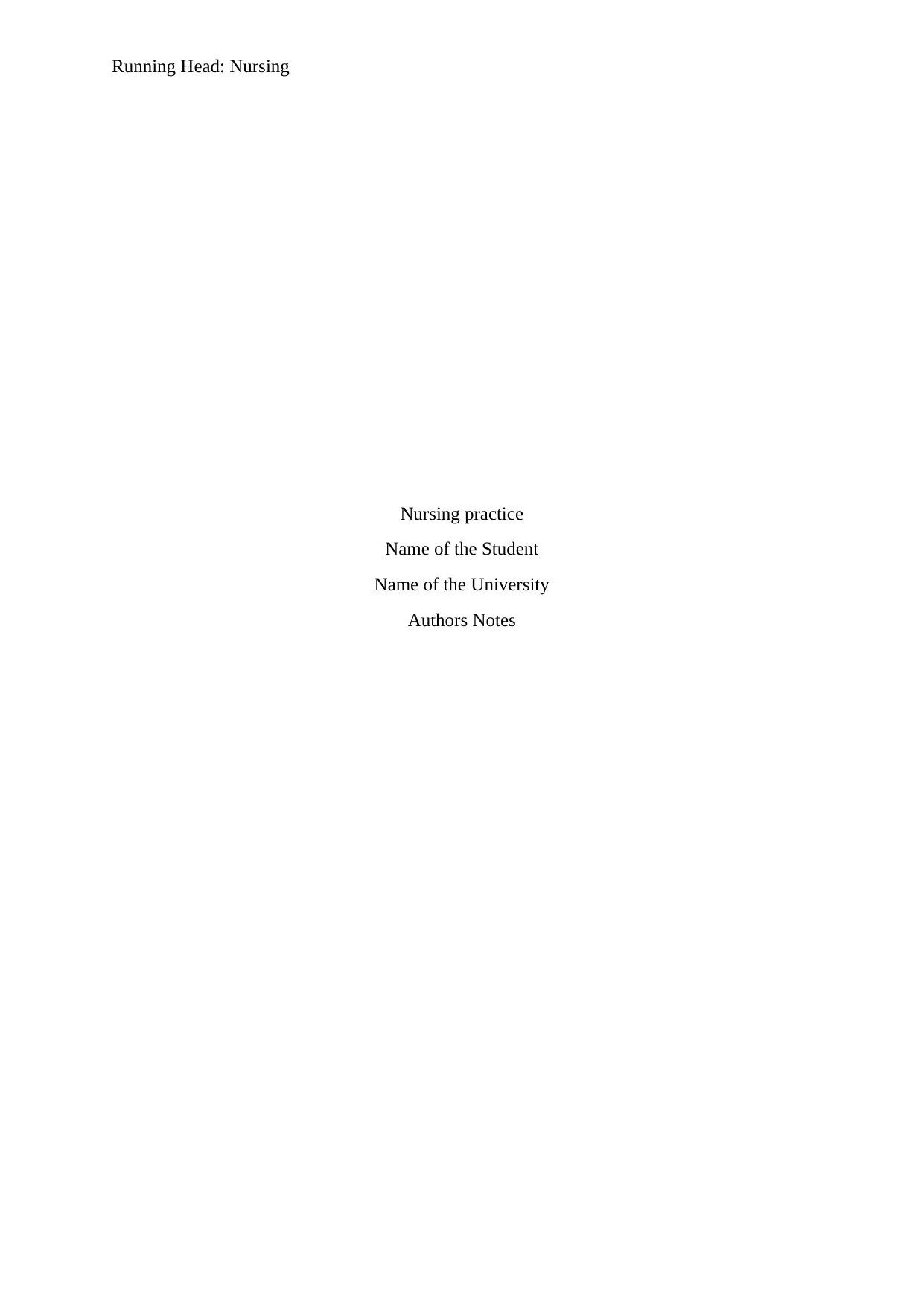
Running Head: Nursing
Nursing practice
Name of the Student
Name of the University
Authors Notes
Nursing practice
Name of the Student
Name of the University
Authors Notes
Paraphrase This Document
Need a fresh take? Get an instant paraphrase of this document with our AI Paraphraser
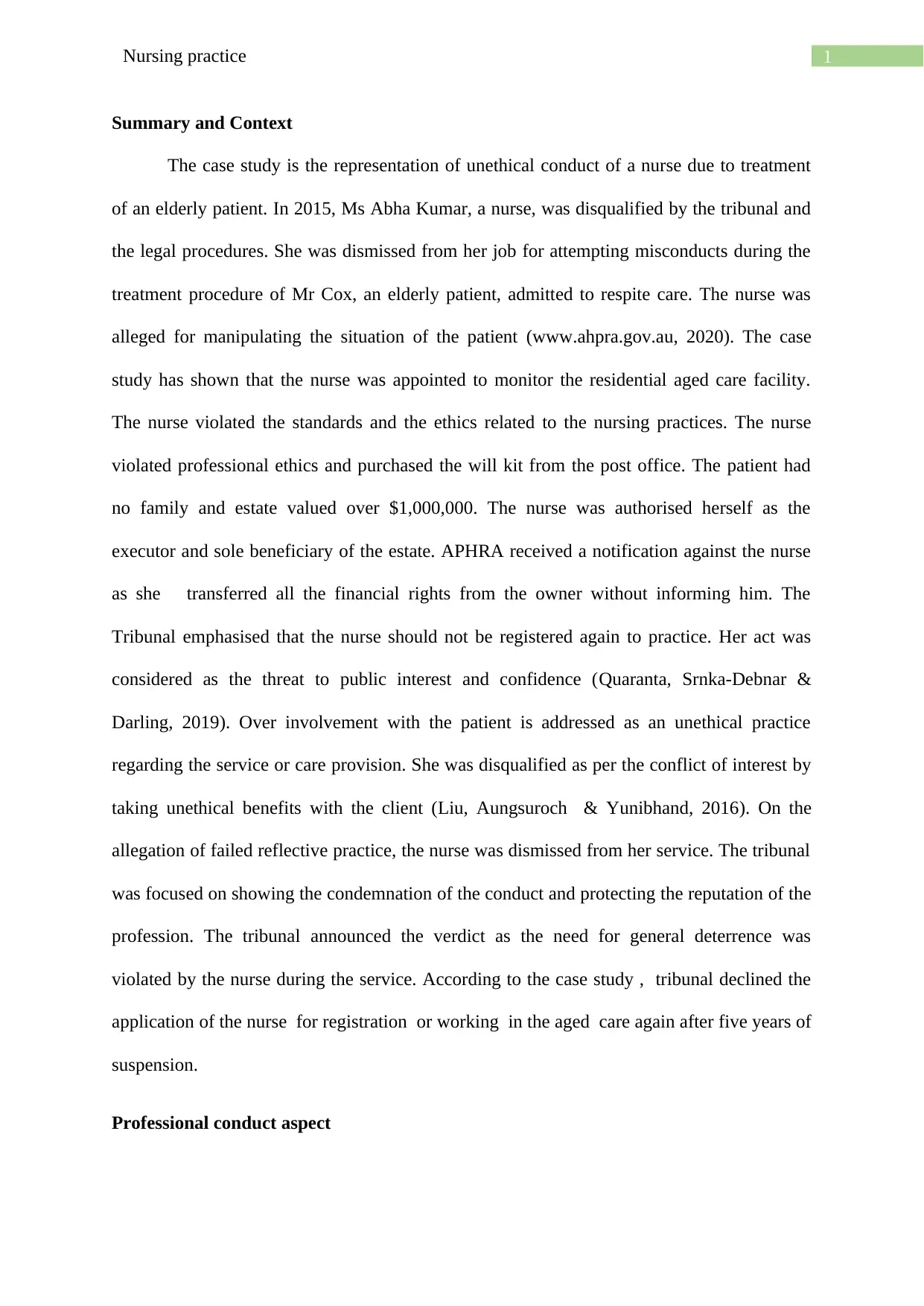
1Nursing practice
Summary and Context
The case study is the representation of unethical conduct of a nurse due to treatment
of an elderly patient. In 2015, Ms Abha Kumar, a nurse, was disqualified by the tribunal and
the legal procedures. She was dismissed from her job for attempting misconducts during the
treatment procedure of Mr Cox, an elderly patient, admitted to respite care. The nurse was
alleged for manipulating the situation of the patient (www.ahpra.gov.au, 2020). The case
study has shown that the nurse was appointed to monitor the residential aged care facility.
The nurse violated the standards and the ethics related to the nursing practices. The nurse
violated professional ethics and purchased the will kit from the post office. The patient had
no family and estate valued over $1,000,000. The nurse was authorised herself as the
executor and sole beneficiary of the estate. APHRA received a notification against the nurse
as she transferred all the financial rights from the owner without informing him. The
Tribunal emphasised that the nurse should not be registered again to practice. Her act was
considered as the threat to public interest and confidence (Quaranta, Srnka-Debnar &
Darling, 2019). Over involvement with the patient is addressed as an unethical practice
regarding the service or care provision. She was disqualified as per the conflict of interest by
taking unethical benefits with the client (Liu, Aungsuroch & Yunibhand, 2016). On the
allegation of failed reflective practice, the nurse was dismissed from her service. The tribunal
was focused on showing the condemnation of the conduct and protecting the reputation of the
profession. The tribunal announced the verdict as the need for general deterrence was
violated by the nurse during the service. According to the case study , tribunal declined the
application of the nurse for registration or working in the aged care again after five years of
suspension.
Professional conduct aspect
Summary and Context
The case study is the representation of unethical conduct of a nurse due to treatment
of an elderly patient. In 2015, Ms Abha Kumar, a nurse, was disqualified by the tribunal and
the legal procedures. She was dismissed from her job for attempting misconducts during the
treatment procedure of Mr Cox, an elderly patient, admitted to respite care. The nurse was
alleged for manipulating the situation of the patient (www.ahpra.gov.au, 2020). The case
study has shown that the nurse was appointed to monitor the residential aged care facility.
The nurse violated the standards and the ethics related to the nursing practices. The nurse
violated professional ethics and purchased the will kit from the post office. The patient had
no family and estate valued over $1,000,000. The nurse was authorised herself as the
executor and sole beneficiary of the estate. APHRA received a notification against the nurse
as she transferred all the financial rights from the owner without informing him. The
Tribunal emphasised that the nurse should not be registered again to practice. Her act was
considered as the threat to public interest and confidence (Quaranta, Srnka-Debnar &
Darling, 2019). Over involvement with the patient is addressed as an unethical practice
regarding the service or care provision. She was disqualified as per the conflict of interest by
taking unethical benefits with the client (Liu, Aungsuroch & Yunibhand, 2016). On the
allegation of failed reflective practice, the nurse was dismissed from her service. The tribunal
was focused on showing the condemnation of the conduct and protecting the reputation of the
profession. The tribunal announced the verdict as the need for general deterrence was
violated by the nurse during the service. According to the case study , tribunal declined the
application of the nurse for registration or working in the aged care again after five years of
suspension.
Professional conduct aspect
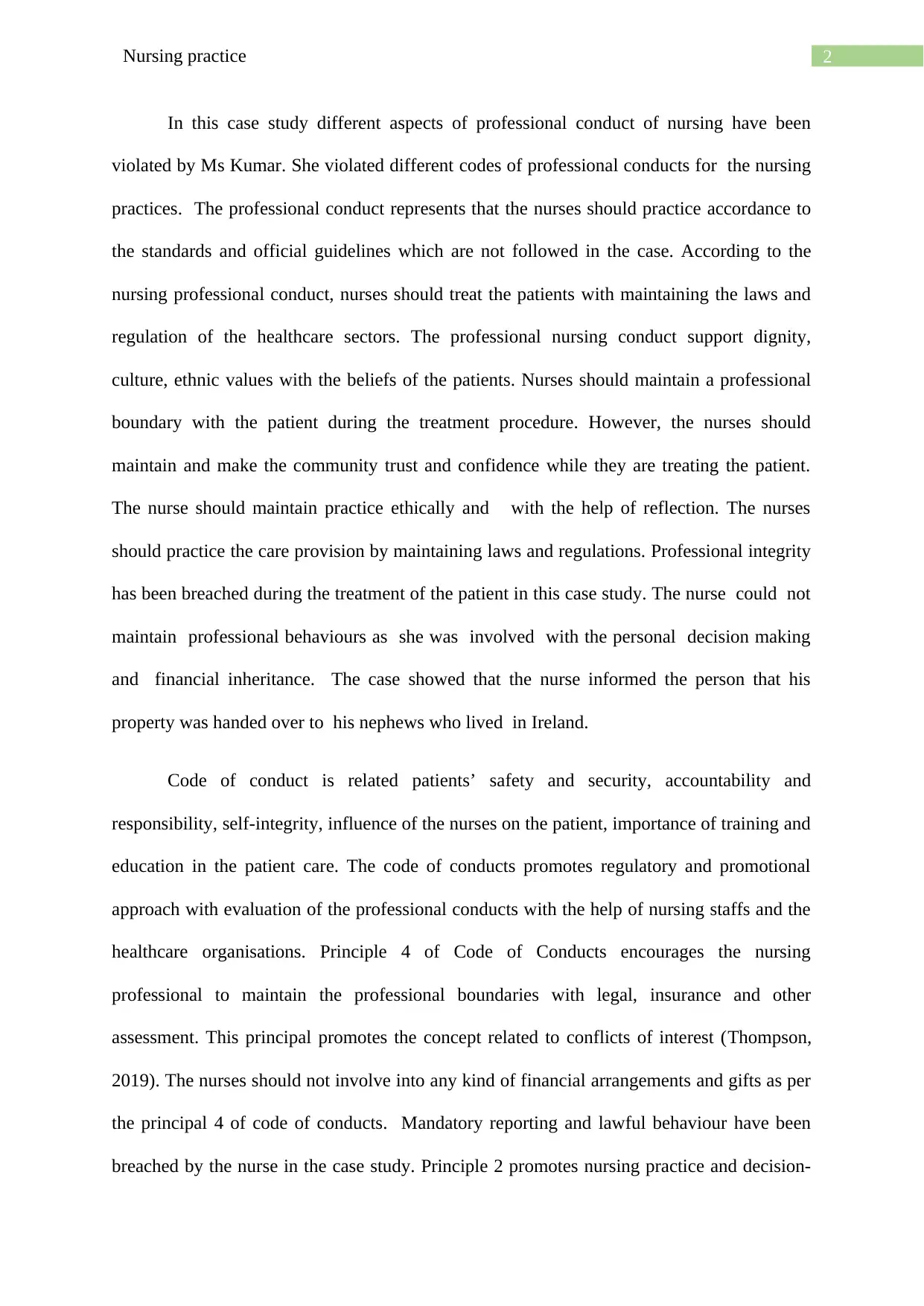
2Nursing practice
In this case study different aspects of professional conduct of nursing have been
violated by Ms Kumar. She violated different codes of professional conducts for the nursing
practices. The professional conduct represents that the nurses should practice accordance to
the standards and official guidelines which are not followed in the case. According to the
nursing professional conduct, nurses should treat the patients with maintaining the laws and
regulation of the healthcare sectors. The professional nursing conduct support dignity,
culture, ethnic values with the beliefs of the patients. Nurses should maintain a professional
boundary with the patient during the treatment procedure. However, the nurses should
maintain and make the community trust and confidence while they are treating the patient.
The nurse should maintain practice ethically and with the help of reflection. The nurses
should practice the care provision by maintaining laws and regulations. Professional integrity
has been breached during the treatment of the patient in this case study. The nurse could not
maintain professional behaviours as she was involved with the personal decision making
and financial inheritance. The case showed that the nurse informed the person that his
property was handed over to his nephews who lived in Ireland.
Code of conduct is related patients’ safety and security, accountability and
responsibility, self-integrity, influence of the nurses on the patient, importance of training and
education in the patient care. The code of conducts promotes regulatory and promotional
approach with evaluation of the professional conducts with the help of nursing staffs and the
healthcare organisations. Principle 4 of Code of Conducts encourages the nursing
professional to maintain the professional boundaries with legal, insurance and other
assessment. This principal promotes the concept related to conflicts of interest (Thompson,
2019). The nurses should not involve into any kind of financial arrangements and gifts as per
the principal 4 of code of conducts. Mandatory reporting and lawful behaviour have been
breached by the nurse in the case study. Principle 2 promotes nursing practice and decision-
In this case study different aspects of professional conduct of nursing have been
violated by Ms Kumar. She violated different codes of professional conducts for the nursing
practices. The professional conduct represents that the nurses should practice accordance to
the standards and official guidelines which are not followed in the case. According to the
nursing professional conduct, nurses should treat the patients with maintaining the laws and
regulation of the healthcare sectors. The professional nursing conduct support dignity,
culture, ethnic values with the beliefs of the patients. Nurses should maintain a professional
boundary with the patient during the treatment procedure. However, the nurses should
maintain and make the community trust and confidence while they are treating the patient.
The nurse should maintain practice ethically and with the help of reflection. The nurses
should practice the care provision by maintaining laws and regulations. Professional integrity
has been breached during the treatment of the patient in this case study. The nurse could not
maintain professional behaviours as she was involved with the personal decision making
and financial inheritance. The case showed that the nurse informed the person that his
property was handed over to his nephews who lived in Ireland.
Code of conduct is related patients’ safety and security, accountability and
responsibility, self-integrity, influence of the nurses on the patient, importance of training and
education in the patient care. The code of conducts promotes regulatory and promotional
approach with evaluation of the professional conducts with the help of nursing staffs and the
healthcare organisations. Principle 4 of Code of Conducts encourages the nursing
professional to maintain the professional boundaries with legal, insurance and other
assessment. This principal promotes the concept related to conflicts of interest (Thompson,
2019). The nurses should not involve into any kind of financial arrangements and gifts as per
the principal 4 of code of conducts. Mandatory reporting and lawful behaviour have been
breached by the nurse in the case study. Principle 2 promotes nursing practice and decision-
⊘ This is a preview!⊘
Do you want full access?
Subscribe today to unlock all pages.

Trusted by 1+ million students worldwide
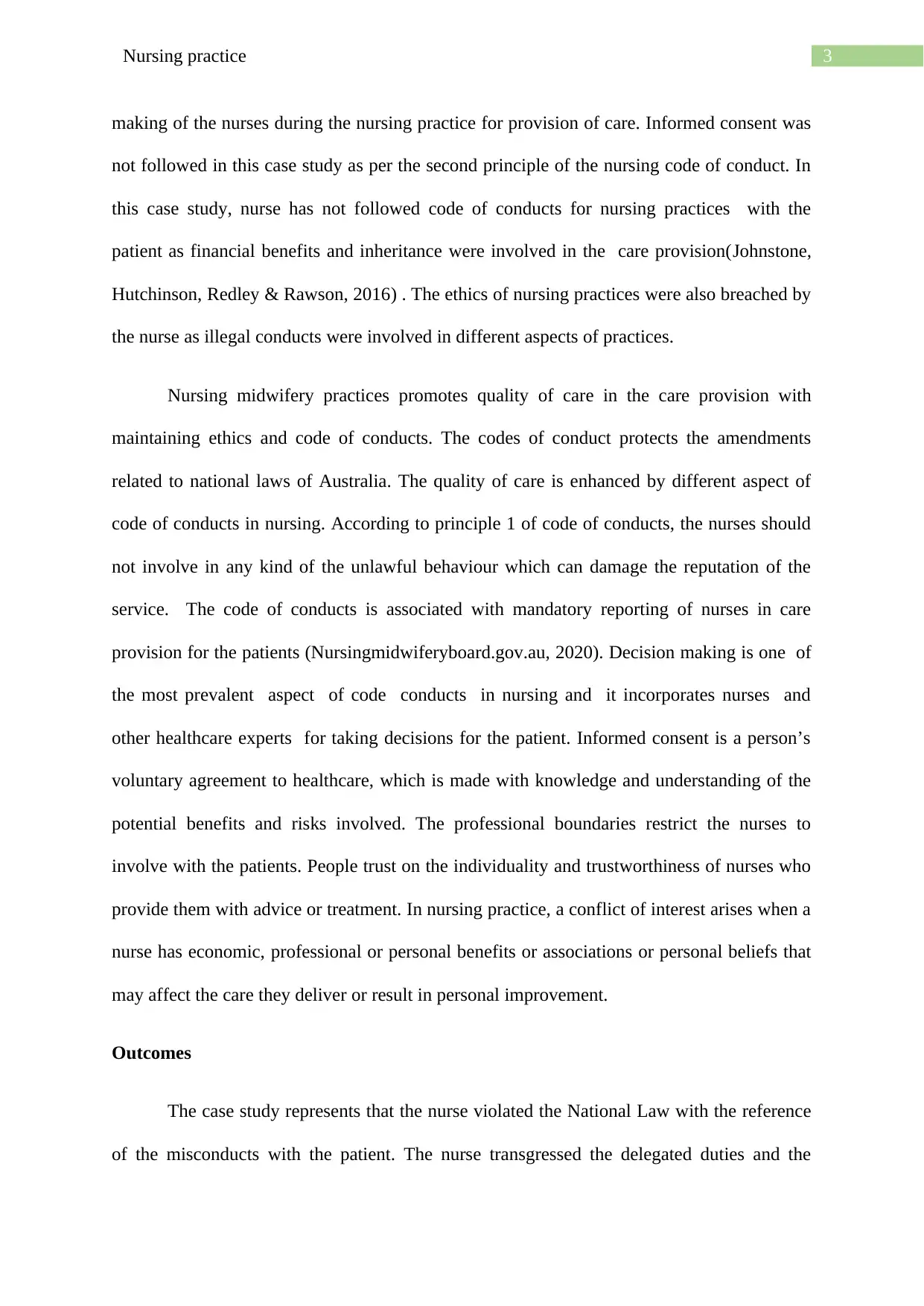
3Nursing practice
making of the nurses during the nursing practice for provision of care. Informed consent was
not followed in this case study as per the second principle of the nursing code of conduct. In
this case study, nurse has not followed code of conducts for nursing practices with the
patient as financial benefits and inheritance were involved in the care provision(Johnstone,
Hutchinson, Redley & Rawson, 2016) . The ethics of nursing practices were also breached by
the nurse as illegal conducts were involved in different aspects of practices.
Nursing midwifery practices promotes quality of care in the care provision with
maintaining ethics and code of conducts. The codes of conduct protects the amendments
related to national laws of Australia. The quality of care is enhanced by different aspect of
code of conducts in nursing. According to principle 1 of code of conducts, the nurses should
not involve in any kind of the unlawful behaviour which can damage the reputation of the
service. The code of conducts is associated with mandatory reporting of nurses in care
provision for the patients (Nursingmidwiferyboard.gov.au, 2020). Decision making is one of
the most prevalent aspect of code conducts in nursing and it incorporates nurses and
other healthcare experts for taking decisions for the patient. Informed consent is a person’s
voluntary agreement to healthcare, which is made with knowledge and understanding of the
potential benefits and risks involved. The professional boundaries restrict the nurses to
involve with the patients. People trust on the individuality and trustworthiness of nurses who
provide them with advice or treatment. In nursing practice, a conflict of interest arises when a
nurse has economic, professional or personal benefits or associations or personal beliefs that
may affect the care they deliver or result in personal improvement.
Outcomes
The case study represents that the nurse violated the National Law with the reference
of the misconducts with the patient. The nurse transgressed the delegated duties and the
making of the nurses during the nursing practice for provision of care. Informed consent was
not followed in this case study as per the second principle of the nursing code of conduct. In
this case study, nurse has not followed code of conducts for nursing practices with the
patient as financial benefits and inheritance were involved in the care provision(Johnstone,
Hutchinson, Redley & Rawson, 2016) . The ethics of nursing practices were also breached by
the nurse as illegal conducts were involved in different aspects of practices.
Nursing midwifery practices promotes quality of care in the care provision with
maintaining ethics and code of conducts. The codes of conduct protects the amendments
related to national laws of Australia. The quality of care is enhanced by different aspect of
code of conducts in nursing. According to principle 1 of code of conducts, the nurses should
not involve in any kind of the unlawful behaviour which can damage the reputation of the
service. The code of conducts is associated with mandatory reporting of nurses in care
provision for the patients (Nursingmidwiferyboard.gov.au, 2020). Decision making is one of
the most prevalent aspect of code conducts in nursing and it incorporates nurses and
other healthcare experts for taking decisions for the patient. Informed consent is a person’s
voluntary agreement to healthcare, which is made with knowledge and understanding of the
potential benefits and risks involved. The professional boundaries restrict the nurses to
involve with the patients. People trust on the individuality and trustworthiness of nurses who
provide them with advice or treatment. In nursing practice, a conflict of interest arises when a
nurse has economic, professional or personal benefits or associations or personal beliefs that
may affect the care they deliver or result in personal improvement.
Outcomes
The case study represents that the nurse violated the National Law with the reference
of the misconducts with the patient. The nurse transgressed the delegated duties and the
Paraphrase This Document
Need a fresh take? Get an instant paraphrase of this document with our AI Paraphraser
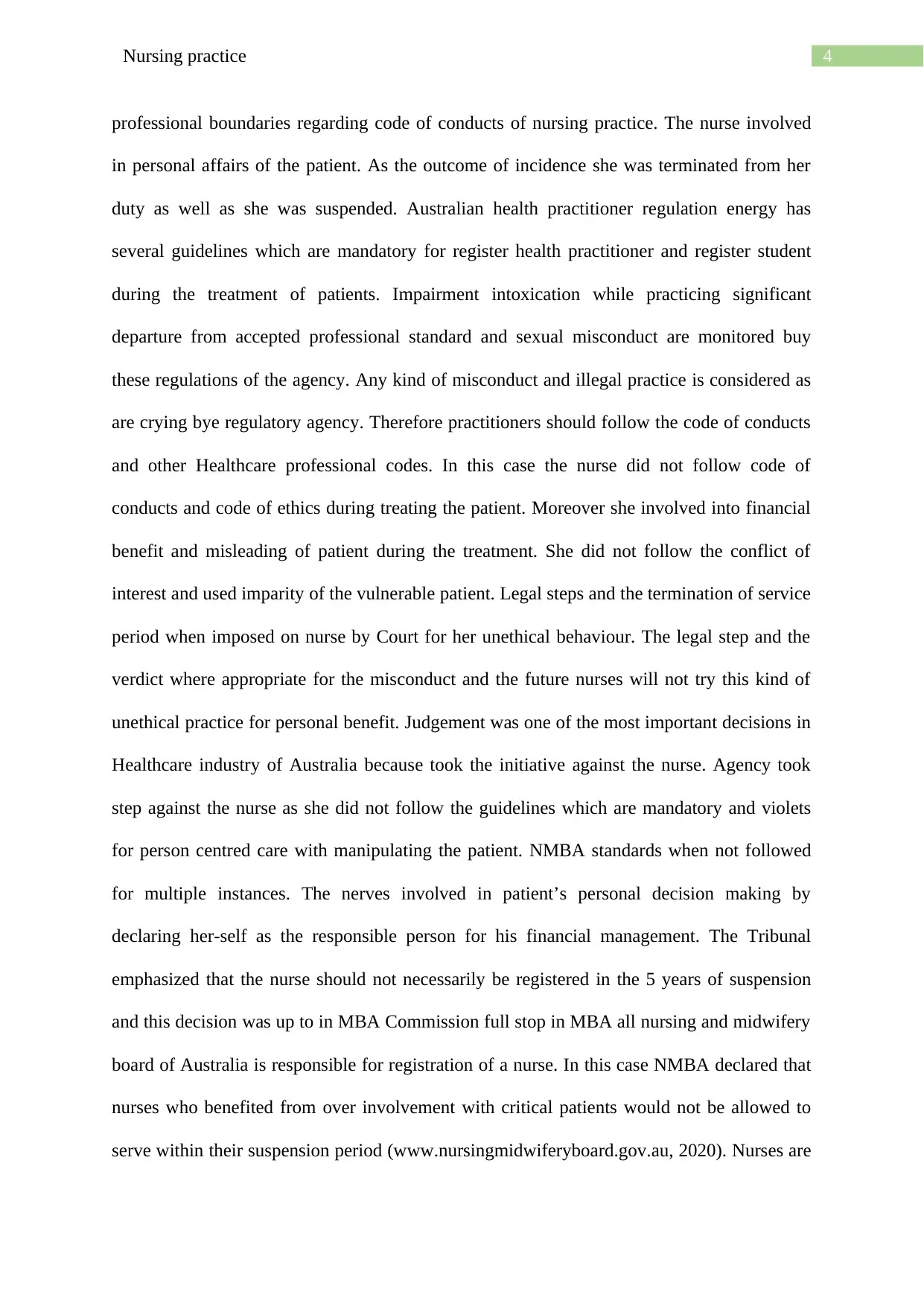
4Nursing practice
professional boundaries regarding code of conducts of nursing practice. The nurse involved
in personal affairs of the patient. As the outcome of incidence she was terminated from her
duty as well as she was suspended. Australian health practitioner regulation energy has
several guidelines which are mandatory for register health practitioner and register student
during the treatment of patients. Impairment intoxication while practicing significant
departure from accepted professional standard and sexual misconduct are monitored buy
these regulations of the agency. Any kind of misconduct and illegal practice is considered as
are crying bye regulatory agency. Therefore practitioners should follow the code of conducts
and other Healthcare professional codes. In this case the nurse did not follow code of
conducts and code of ethics during treating the patient. Moreover she involved into financial
benefit and misleading of patient during the treatment. She did not follow the conflict of
interest and used imparity of the vulnerable patient. Legal steps and the termination of service
period when imposed on nurse by Court for her unethical behaviour. The legal step and the
verdict where appropriate for the misconduct and the future nurses will not try this kind of
unethical practice for personal benefit. Judgement was one of the most important decisions in
Healthcare industry of Australia because took the initiative against the nurse. Agency took
step against the nurse as she did not follow the guidelines which are mandatory and violets
for person centred care with manipulating the patient. NMBA standards when not followed
for multiple instances. The nerves involved in patient’s personal decision making by
declaring her-self as the responsible person for his financial management. The Tribunal
emphasized that the nurse should not necessarily be registered in the 5 years of suspension
and this decision was up to in MBA Commission full stop in MBA all nursing and midwifery
board of Australia is responsible for registration of a nurse. In this case NMBA declared that
nurses who benefited from over involvement with critical patients would not be allowed to
serve within their suspension period (www.nursingmidwiferyboard.gov.au, 2020). Nurses are
professional boundaries regarding code of conducts of nursing practice. The nurse involved
in personal affairs of the patient. As the outcome of incidence she was terminated from her
duty as well as she was suspended. Australian health practitioner regulation energy has
several guidelines which are mandatory for register health practitioner and register student
during the treatment of patients. Impairment intoxication while practicing significant
departure from accepted professional standard and sexual misconduct are monitored buy
these regulations of the agency. Any kind of misconduct and illegal practice is considered as
are crying bye regulatory agency. Therefore practitioners should follow the code of conducts
and other Healthcare professional codes. In this case the nurse did not follow code of
conducts and code of ethics during treating the patient. Moreover she involved into financial
benefit and misleading of patient during the treatment. She did not follow the conflict of
interest and used imparity of the vulnerable patient. Legal steps and the termination of service
period when imposed on nurse by Court for her unethical behaviour. The legal step and the
verdict where appropriate for the misconduct and the future nurses will not try this kind of
unethical practice for personal benefit. Judgement was one of the most important decisions in
Healthcare industry of Australia because took the initiative against the nurse. Agency took
step against the nurse as she did not follow the guidelines which are mandatory and violets
for person centred care with manipulating the patient. NMBA standards when not followed
for multiple instances. The nerves involved in patient’s personal decision making by
declaring her-self as the responsible person for his financial management. The Tribunal
emphasized that the nurse should not necessarily be registered in the 5 years of suspension
and this decision was up to in MBA Commission full stop in MBA all nursing and midwifery
board of Australia is responsible for registration of a nurse. In this case NMBA declared that
nurses who benefited from over involvement with critical patients would not be allowed to
serve within their suspension period (www.nursingmidwiferyboard.gov.au, 2020). Nurses are
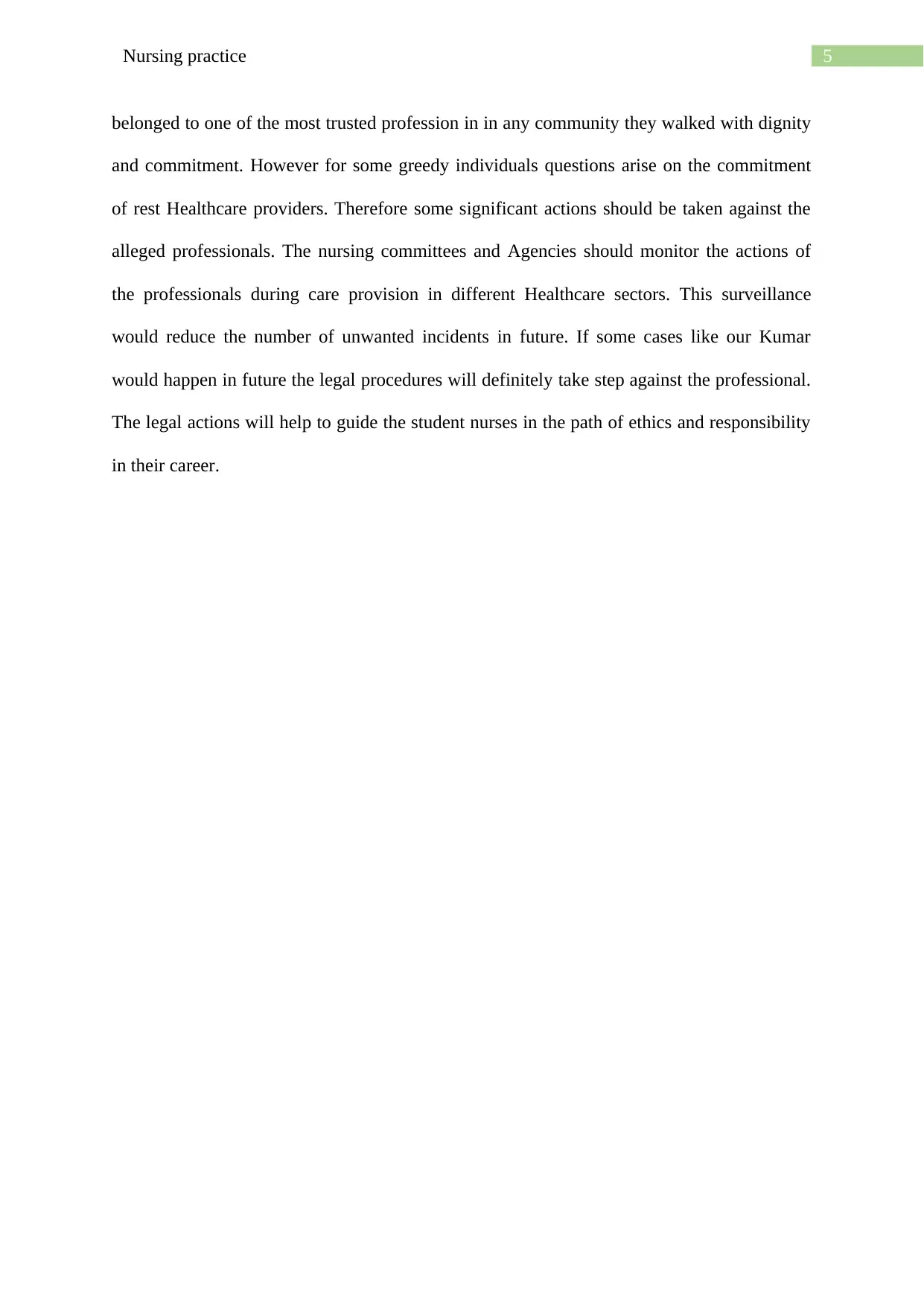
5Nursing practice
belonged to one of the most trusted profession in in any community they walked with dignity
and commitment. However for some greedy individuals questions arise on the commitment
of rest Healthcare providers. Therefore some significant actions should be taken against the
alleged professionals. The nursing committees and Agencies should monitor the actions of
the professionals during care provision in different Healthcare sectors. This surveillance
would reduce the number of unwanted incidents in future. If some cases like our Kumar
would happen in future the legal procedures will definitely take step against the professional.
The legal actions will help to guide the student nurses in the path of ethics and responsibility
in their career.
belonged to one of the most trusted profession in in any community they walked with dignity
and commitment. However for some greedy individuals questions arise on the commitment
of rest Healthcare providers. Therefore some significant actions should be taken against the
alleged professionals. The nursing committees and Agencies should monitor the actions of
the professionals during care provision in different Healthcare sectors. This surveillance
would reduce the number of unwanted incidents in future. If some cases like our Kumar
would happen in future the legal procedures will definitely take step against the professional.
The legal actions will help to guide the student nurses in the path of ethics and responsibility
in their career.
⊘ This is a preview!⊘
Do you want full access?
Subscribe today to unlock all pages.

Trusted by 1+ million students worldwide
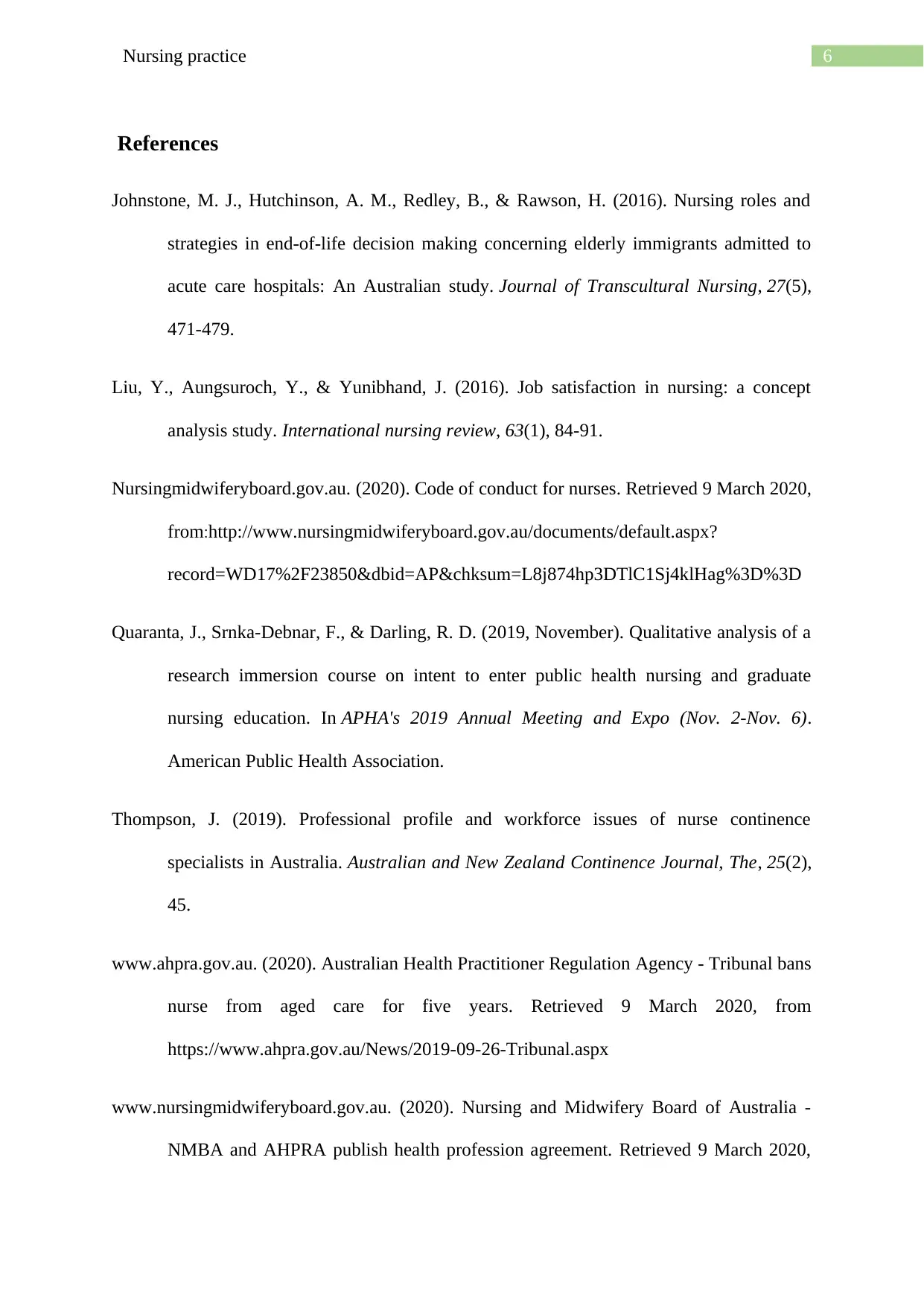
6Nursing practice
References
Johnstone, M. J., Hutchinson, A. M., Redley, B., & Rawson, H. (2016). Nursing roles and
strategies in end-of-life decision making concerning elderly immigrants admitted to
acute care hospitals: An Australian study. Journal of Transcultural Nursing, 27(5),
471-479.
Liu, Y., Aungsuroch, Y., & Yunibhand, J. (2016). Job satisfaction in nursing: a concept
analysis study. International nursing review, 63(1), 84-91.
Nursingmidwiferyboard.gov.au. (2020). Code of conduct for nurses. Retrieved 9 March 2020,
from:http://www.nursingmidwiferyboard.gov.au/documents/default.aspx?
record=WD17%2F23850&dbid=AP&chksum=L8j874hp3DTlC1Sj4klHag%3D%3D
Quaranta, J., Srnka-Debnar, F., & Darling, R. D. (2019, November). Qualitative analysis of a
research immersion course on intent to enter public health nursing and graduate
nursing education. In APHA's 2019 Annual Meeting and Expo (Nov. 2-Nov. 6).
American Public Health Association.
Thompson, J. (2019). Professional profile and workforce issues of nurse continence
specialists in Australia. Australian and New Zealand Continence Journal, The, 25(2),
45.
www.ahpra.gov.au. (2020). Australian Health Practitioner Regulation Agency - Tribunal bans
nurse from aged care for five years. Retrieved 9 March 2020, from
https://www.ahpra.gov.au/News/2019-09-26-Tribunal.aspx
www.nursingmidwiferyboard.gov.au. (2020). Nursing and Midwifery Board of Australia -
NMBA and AHPRA publish health profession agreement. Retrieved 9 March 2020,
References
Johnstone, M. J., Hutchinson, A. M., Redley, B., & Rawson, H. (2016). Nursing roles and
strategies in end-of-life decision making concerning elderly immigrants admitted to
acute care hospitals: An Australian study. Journal of Transcultural Nursing, 27(5),
471-479.
Liu, Y., Aungsuroch, Y., & Yunibhand, J. (2016). Job satisfaction in nursing: a concept
analysis study. International nursing review, 63(1), 84-91.
Nursingmidwiferyboard.gov.au. (2020). Code of conduct for nurses. Retrieved 9 March 2020,
from:http://www.nursingmidwiferyboard.gov.au/documents/default.aspx?
record=WD17%2F23850&dbid=AP&chksum=L8j874hp3DTlC1Sj4klHag%3D%3D
Quaranta, J., Srnka-Debnar, F., & Darling, R. D. (2019, November). Qualitative analysis of a
research immersion course on intent to enter public health nursing and graduate
nursing education. In APHA's 2019 Annual Meeting and Expo (Nov. 2-Nov. 6).
American Public Health Association.
Thompson, J. (2019). Professional profile and workforce issues of nurse continence
specialists in Australia. Australian and New Zealand Continence Journal, The, 25(2),
45.
www.ahpra.gov.au. (2020). Australian Health Practitioner Regulation Agency - Tribunal bans
nurse from aged care for five years. Retrieved 9 March 2020, from
https://www.ahpra.gov.au/News/2019-09-26-Tribunal.aspx
www.nursingmidwiferyboard.gov.au. (2020). Nursing and Midwifery Board of Australia -
NMBA and AHPRA publish health profession agreement. Retrieved 9 March 2020,
Paraphrase This Document
Need a fresh take? Get an instant paraphrase of this document with our AI Paraphraser

7Nursing practice
from https://www.nursingmidwiferyboard.gov.au/News/2015-11-24-media-
release.aspx
from https://www.nursingmidwiferyboard.gov.au/News/2015-11-24-media-
release.aspx
1 out of 8
Related Documents
Your All-in-One AI-Powered Toolkit for Academic Success.
+13062052269
info@desklib.com
Available 24*7 on WhatsApp / Email
![[object Object]](/_next/static/media/star-bottom.7253800d.svg)
Unlock your academic potential
Copyright © 2020–2026 A2Z Services. All Rights Reserved. Developed and managed by ZUCOL.





